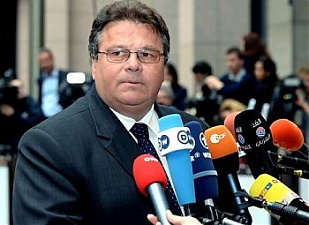Analytics, Baltic States – CIS, Economics, EU – Baltic States, Financial Services, Lithuania, Markets and Companies
International Internet Magazine. Baltic States news & analytics
Tuesday, 20.01.2026, 15:21
Lithuanian MFA: nobody wishes Russia to collapse
 Print version
Print version |
|---|
The head of Lithuanian diplomacy says the situation Russia finds itself in is dramatic but could have been predicted.
"There is nothing to rejoice at. In fact nobody wishes Russia to collapse and go bankrupt. Frankly, it is food for thought for Russia to change its course because what is happening now is unacceptable in every term, both to the world and to Russia as well. It is time to finally understand this," Linkevicius told the radio Ziniu Radijas on Wednesday morning.
According to the foreign minister, the current financial crisis is another signal for Russia to change its policy, although there have been plenty of such signals before. Linkevicius said that "there is no other way how to remind Russia to change its course". The foreign minister did not speculate whether it is enough. He said it depends not only on Russian President Vladimir Putin but on all of the Russian leaders.
Linkevicius agreed with the opinion of economists that the rouble's crisis is far worse news to Lithuania than the embargo of its products.
"That is why I have said that there is nothing to be happy about (). Anytime such events occur in neighbouring countries it affects us. Therefore, let me reiterate that we truly do not wish Russia to experience a crisis or a catastrophe. We just deeply wish for Russia to change its thinking," said the foreign affairs minister.
Linkevicius did not exclude "a theoretical possibility" that due to the current situation Russia's foreign policy might become more aggressive. However, this would not be a way out of the situation but just a short-term prospect. The foreign minister said that this would not be a suitable answer to the situation.
According to Linkevicius, recent ambiguous statements by Russian Minister of Foreign Affairs Sergey Lavrov about the deployment of nuclear weapons in Crimea and instantly afterwards about the intentions to improve relations with the European Union and NATO is a perfect example of Russia's policy and the state that it is in.
"On the one hand, Russia would like to show its "muscles", power and might, () perhaps intimidate hoping that someone will waver and retreat. On the other hand, it realises that a path of confrontation does not lead anywhere. One has to cooperate, find a common position and, without a doubt, it would be beneficial for Russia to have some possibility to communicate with Europe," said Linkevicius. According to him that is why the mix of various statements has emerged. Russia wanted to demonstrate power, but it is running out of money for this. Linkevicius hopes that Russian strategists realise that a path towards confrontation in the 21st century is hopeless and unviable both in political and economic sense.
The exchange rate of the Russian rouble against the US dollar has plummeted to record lows, despite the central bank's efforts to stop this from happening. Since the beginning of 2014 the rouble against the dollar has fallen by nearly 50 percent.








 «The Baltic Course» Is Sold and Stays in Business!
«The Baltic Course» Is Sold and Stays in Business!

